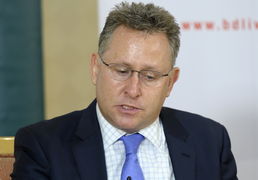Vital lessons for infrastructure projects
by Razina Munshi,
2013-11-13 17:48:04.0
THE celebrated success of the government’s renewable energy procurement process has the potential to spill over into other state infrastructure projects. Nicky Prins, director of capital projects at the Treasury, told Business Day that plans were in place to transfer the lessons of the Independent Power Producer (IPP) programme to the other government infrastructure projects.
The Treasury’s task team responsible for the private-sector financing of infrastructure, which Ms Prins chairs, will explore how best to share those lessons with teams involved in the procurement of infrastructure in other sectors.
The IPP programme, for example, was based on detailed planning. Studies were conducted where sector experts were brought in to conduct modelling exercises for each of the renewable technologies; and the best way to conduct the procurement.
The procurement process, its documentation and terms and conditions were also standardised to give certainty to the programme, and gradually reduce its associated risk.
Ms Prins said departments such as public enterprises were part of the task team, which also included representatives from business and labour. They were there to learn from these lessons. Similarly, the Presidential Infrastructure Co-ordinating Commission is also part of the team.
The programme was regarded as the biggest and most complex private procurement exercise ever conducted in South Africa, according to University of Cape Town Graduate School of Business’s Anton Eberhard. "We now know that we can run complex public-procurement exercises."
This meant, he said, that South Africa must look at extending it beyond renewables.
In addition, South African National Energy Association chairman Brain Statham said the government engaged with foreign investors in the programme in a "sensible and rationale way". That can only be good for other sectors, particularly those requiring urgent investment. The energy programme, he said, had helped South Africa to establish credibility.
"The spin-offs will extend well beyond renewable energy," he said.
Local banks have long been supportive of public private partnerships. But according to Nedbank Capital’s head of infrastructure, energy and telecoms, Michael Peo, lack of deal flow has hampered enthusiasm in recent years.
The IPP programme, which was welcomed by local and foreign investors, operators, suppliers and builders, has the potential to change that. It was a well thought-out process, with a massive team of advisors and a deliberate effort to give the industry confidence.
The size and structure of future coal, nuclear and gas IPPs, Mr Peo said, will dictate the response of foreign investors. And beyond energy, sectors like transport should be next, he said. This structure could be the capacity for many more investments.
The government has about R4.3-trillion in infrastructure projects on the table. Projects include energy, transport, telecoms, water, health and education.
Private participation, which has long been a point of contention within the government, is set to be a means to design, fund and even operate some of those assets. State transport and logistics group Transnet, for example, has said it will use private funds to build its proposed dig-out port in Durban.
Ms Prins expected the IPP programme to guide other future private public partnerships.
She said the government had been strategic in the way it chose to roll out the IPP programme.
It realised up front that successive small rounds of procurement, instead of one process, would lower the risk associated with it, and increase the competition. Both elements were critical to driving down the price of renewable energy projects.
In addition, Ms Prins said this rolling strategy fitted with the government’s strategy to feed in new energy generation projects gradually, as demand for electricity grew. She said that renewable technology was still maturing. Prices had dropped globally and the benefits of lower prices could be realised with each round. The government accepted these elements and designed the programme accordingly.
Transferring relevant principles to others, she said, would be critical for the planning of future capital projects in South Africa.
THE celebrated success of the government’s renewable energy procurement process has the potential to spill over into other state infrastructure projects. Nicky Prins, director of capital projects at the Treasury, told Business Day that plans were in place to transfer the lessons of the Independent Power Producer (IPP) programme to the other government infrastructure projects.
The Treasury’s task team responsible for the private-sector financing of infrastructure, which Ms Prins chairs, will explore how best to share those lessons with teams involved in the procurement of infrastructure in other sectors.
The IPP programme, for example, was based on detailed planning. Studies were conducted where sector experts were brought in to conduct modelling exercises for each of the renewable technologies; and the best way to conduct the procurement.
The procurement process, its documentation and terms and conditions were also standardised to give certainty to the programme, and gradually reduce its associated risk.
Ms Prins said departments such as public enterprises were part of the task team, which also included representatives from business and labour. They were there to learn from these lessons. Similarly, the Presidential Infrastructure Co-ordinating Commission is also part of the team.
The programme was regarded as the biggest and most complex private procurement exercise ever conducted in South Africa, according to University of Cape Town Graduate School of Business’s Anton Eberhard. "We now know that we can run complex public-procurement exercises."
This meant, he said, that South Africa must look at extending it beyond renewables.
In addition, South African National Energy Association chairman Brain Statham said the government engaged with foreign investors in the programme in a "sensible and rationale way". That can only be good for other sectors, particularly those requiring urgent investment. The energy programme, he said, had helped South Africa to establish credibility.
"The spin-offs will extend well beyond renewable energy," he said.
Local banks have long been supportive of public private partnerships. But according to Nedbank Capital’s head of infrastructure, energy and telecoms, Michael Peo, lack of deal flow has hampered enthusiasm in recent years.
The IPP programme, which was welcomed by local and foreign investors, operators, suppliers and builders, has the potential to change that. It was a well thought-out process, with a massive team of advisors and a deliberate effort to give the industry confidence.
The size and structure of future coal, nuclear and gas IPPs, Mr Peo said, will dictate the response of foreign investors. And beyond energy, sectors like transport should be next, he said. This structure could be the capacity for many more investments.
The government has about R4.3-trillion in infrastructure projects on the table. Projects include energy, transport, telecoms, water, health and education.
Private participation, which has long been a point of contention within the government, is set to be a means to design, fund and even operate some of those assets. State transport and logistics group Transnet, for example, has said it will use private funds to build its proposed dig-out port in Durban.
Ms Prins expected the IPP programme to guide other future private public partnerships.
She said the government had been strategic in the way it chose to roll out the IPP programme.
It realised up front that successive small rounds of procurement, instead of one process, would lower the risk associated with it, and increase the competition. Both elements were critical to driving down the price of renewable energy projects.
In addition, Ms Prins said this rolling strategy fitted with the government’s strategy to feed in new energy generation projects gradually, as demand for electricity grew. She said that renewable technology was still maturing. Prices had dropped globally and the benefits of lower prices could be realised with each round. The government accepted these elements and designed the programme accordingly.
Transferring relevant principles to others, she said, would be critical for the planning of future capital projects in South Africa.













 Read more about the Business Day Dialogue on renewable energy, presented with Nedbank Capital
Read more about the Business Day Dialogue on renewable energy, presented with Nedbank Capital




 Register for our
Register for our 



Change: -0.47%
Change: -0.57%
Change: -1.76%
Change: -0.34%
Change: 0.02%
Data supplied by Profile Data
Change: -1.49%
Change: 0.08%
Change: -0.47%
Change: 0.00%
Change: -0.04%
Data supplied by Profile Data
Change: -0.34%
Change: 0.03%
Change: -0.10%
Change: -0.22%
Change: -0.81%
Data supplied by Profile Data
Change: -0.28%
Change: -1.15%
Change: -0.07%
Change: -1.21%
Change: -0.22%
Data supplied by Profile Data